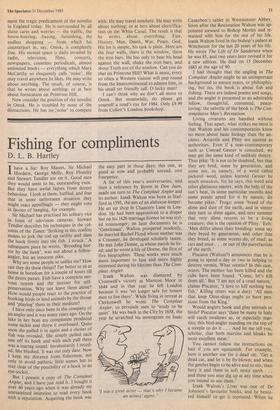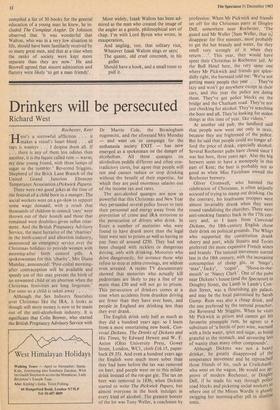Fishing for compliments
D. L. B. Hartley Ihave a list: Roy Mason, Sir Michael Hordern, George Melly, Roy Plomley and Stewart Tendler are on it. Good men they would seem to be, outstanding even. But they have awful lapses from decent behaviour. I look at them, baffled, and fear that in some unforeseen situation they might react appallingly — they might vote in favour of hanging, for example.
Sir Michael has practised his solitary vice In front of television cameras. Stewart Tendler describes his techniques in the col- umns of the Times: 'Striking in this context means to jerk the rod up swiftly and slam the hook firmly into the fish. I struck.' A subsequent piece he wrote, 'Brooding hor- ror by the bank', was not about a fellow- angler, but an innocent pike.
Why are some people so unlike me? How can they do these things? Far better to sit at home in boredom for a couple of hours till the desire passes. Fish have a complete ner- vous system and the instinct for self- preservation. Why not leave them alone? How would people react to the practice of hooking birds or land animals by the throat and 'playing' them in their medium? I have only once been in the company of an angler and it was many years ago. On the lake in her boat my companion produced some tackle and threw it overboard. Quite soon she pulled it in again and a cluster of fish was revealed. She simply pulled each one off its hook and with each pull there was a tearing sound. Involuntarily I recoil- ed. She blushed. It was our only date. Now I keep my distance from fishermen, not only to avoid pathetic little scenes but to stay clear of the possibility of a hook in an eye-socket.
But I possess a copy of The Compleat Angler, and I have just read it. I bought it over 40 years ago when it was already my unexamined intention to read every book with a reputation. Acquiring the book was
the easy part in those days; this one, as good as new and probably unread, cost fourpence.
A list of this year's anniversaries, and then a reference by Byron in Don Juan, made me turn to The Compleat Angler and its author. Izaak Walton was born in Staf- ford in 1593, the son of an alehouse-keeper. He set up shop in Chancery Lane in Lon- don. He had been apprenticed to a draper but on his 1626 marriage licence he was styl- ed ironmonger; on later documents he is 'Gentleman'. Walton prospered modestly, he married Rachel Floyd whose mother was a Cranmer, he developed scholarly tastes. He met John Donne, in whose parish he liv- ed; and he wrote a life of Donne, the first of five biographies. These works were much more important to him and more highly esteemed during his lifetime than The Com- pleat Angler. Izaak Walton was dismayed by Cromwell's victory at Marston Moor in 1644 and in that year he left London because it was `no longer safe for honest men to live there'. While living in retreat at Clerkenwell he wrote The Compleat Angler, to persuade men to 'study to be quiet'. He was back in the City.by 1658, the year he scratched his monogram on Isaac I was a great actor — that's why I became an actors' agent.'
Casaubon's tablet in Westminster Abbey. Soon after the Restoration Walton was ap- pointed steward to Bishop Morley and re- mained with him for the rest of his life. Izaak Walton lived in the bishop's palace at
Winchester for the last 20 years of his life. He wrote The Life of Dr Sanderson when he was 85, and two years later revised it for a new edition. He died on 15 December 1683 at the age of 90.
I had thought that the angling in The Compleat Angler might be an unimportant
background to nature notes, or philosphis- ing, but no, the book is about fish and fishing. There are indeed poems and songs,
and the angler is presented as an admirable fellow, thoughtful, contented, peace- loving: the subtitle of the book is The Con- templative Man's Recreation.
Living creatures are handled without feeling. That apart, what strikes me most is that Walton and his contemporaries knew no more about basic biology than the an- cients. Aristotle and Pliny are quoted as authorities. Even if a near-contemporary such as Conrad Gesner is consulted, we may get the same kind of unlikely theory.
Thus pike: 'It is not to be doubted, but that they are bred, some by generation, and some not, as namely, of a weed called pickerel weed, unless learned Gesner be much mistaken, for he says, this weed and other glutinous matter, with the help of the sun's heat, in some particular months and some ponds apted for it by nature, do become pikes.' Frogs: some 'breed of the slime and dust of the earth, and in winter they turn to slime again, and next summer that very slime returns to be a living creature; this is the opinion of Pliny.' Eels: 'Men differ about their breeding: some say they breed by generation, and other that they breed, as some worms do, of mud; as rats and mice . . or out of the putrefaction of the earth.'
Piscator (Walton?) announces that he is going to spend a day or two in helping to destroy vermin. What vermin? In this case, otters. The mother has been killed and the cubs have been found. 'Come, let's kill them all.' But 'I am not of a cruel nature,' claims Piscator, '1 love to kill nothing but fish.' Killing otters was a duty: 'All men that keep Otter-dogs ought to have pen- sions from the King.'
Would anglers hook and play animals or birds? Piscator says 'there be many in Italy will catch swallows so, or especially mar- tins; this bird-angler standing on the top of a steeple to do it , And let me tell you, scholar, that both martins and bleaks be most excellent meat.'
You cannot follow the instructions on bait if you are squeamish. For example, here is another use for a dead cat. 'Get a dead cat, and let it be fly-blown; and when the gentles begin to be alive and to stir, then bury it and them in soft moist earth . . and these you may dig up at any time when you intend to use them.'
Izaak Walton's Lives was one of Dr Johnson's favourite books, and he bestir- red himself to get it reprinted. When he compiled a list of 30 books for the general education of a young man he knew, he in- cluded The Compleat Angler. Dr Johnson observed that `it was wonderful that Walton, who was in a very low situation in life, should have been familiarly received by so many great men, and that at a time when the ranks of society were kept more separate than they are now.' He and Boswell agreed that sincere admiration and flattery were likely `to get a man friends'.
More widely, Izaak Walton has been ad- mired as the man who created the image of the angler as a gentle, philosophical sort of chap. I'm with Lord Byron who wrote, in exasperation, And angling, too, that solitary vice, Whatever Izaak Walton sings or says; The quaint, old cruel coxcomb, in his gullet Should have a hook, and a small trout to pull it.















































 Previous page
Previous page